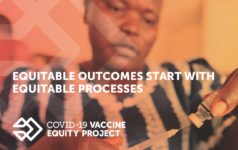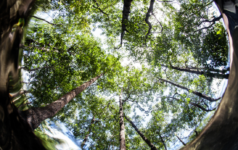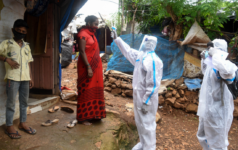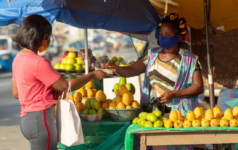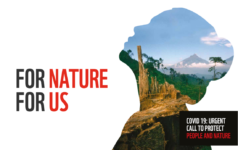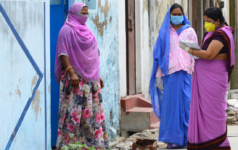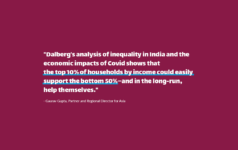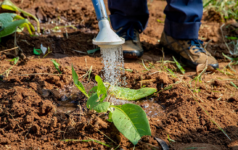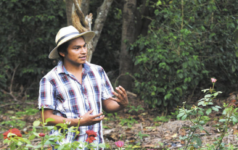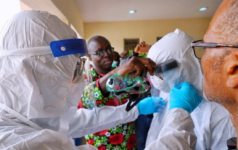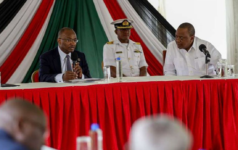Dalberg uses cookies and related technologies to improve the way the site functions. A cookie is a text file that is stored on your device. We use these text files for functionality such as to analyze our traffic or to personalize content. You can easily control how we use cookies on your device by adjusting the settings below, and you may also change those settings at any time by visiting our privacy policy page.
As the Covid-19 crisis deepens funding gaps for environmental projects, Dalberg sees that debt-for-nature swaps may provide new avenues for financing—and a ‘win-win’ opportunity for developing countries to trade debt for investment in the environment.
Across the globe, Covid-19 has impacted government revenues and shifted spending priorities to health and the economy, leaving the environmental agenda very much at risk. Other main sources of environmental revenue are also expected to drop, including external private finance and official development assistance (ODA), with estimates that external investment in ODA-eligible countries could drop by $700 billion from 2019 figures.[2]
Prior to the disruption brought on by the pandemic, 2020 was intended as a “super year for Nature”, and several global climate conferences were expected to secure funding to slow climate change and protect biodiversity. Instead, the future of environmental financing looks increasingly uncertain —at a time when more rather than less is needed.
Implications for climate and the environment
In the current climate, conservation programs in low- and middle-income countries are particularly at risk, with financing of these programs usually dependent on tourism and ecotourism, now at a standstill. As a result, funding for monitoring and enforcement in community conservation areas around the world has been depleted.
In Brazil, for example, the federal environmental agency has announced cuts to enforcement duties due to limited funding—including the protection of the Amazon from accelerating deforestation. Increased threats from illegal logging and land conversion have also been reported in Cambodia, Tunisia and other nations that are particularly dependent on ecotourism.[3]
Decades of wildlife conservation efforts in Africa are also in jeopardy as a result of depleted tourism revenues. Uganda Wildlife Authority recorded 367 poaching incidents across the country between February and June of this year (2020), more than double the 163 cases recorded during a similar period in 2019. The increases are attributed to the Covid-19 lockdown, the lost income for people who work in the tourism industry, and inadequate human resources to cover all conservation areas. Tourism is Uganda’s leading source of foreign exchange, and brought in $1.6 billion in the 2018-2019 financial year alone.[7]
Debt burden: rising debt pressure and restricted fiscal space
Many countries are borrowing funds and increasing their debt-to-GDP ratios to meet the significant spending needs of the Covid-crisis. In 2020 government debt levels in Sub-Saharan Africa reached an average of 50% of GDP,[4] with some countries, like Sudan, Liberia, Cape Verde and Mozambique, having a ratio higher than 100%.
Debt servicing, particularly in foreign currencies, diverts public resources away from domestic expenditure, often leading countries to under invest in local priorities. For instance, over 64 low-income countries spend more annually on external debt payments than on healthcare.[5]
In addition, the need to obtain foreign currencies for debt servicing leads some countries to unsustainably exploit natural resources, such as excessive logging, mining, fishing, deforestation and land conversion. For now, the G20 has frozen debt payments from 75 countries until the end of 2020—but this is a temporary panacea.
In light of the current situation, debt-for-nature swaps could provide an avenue to free up necessary domestic funds to invest in nature across all countries.
Debt-for-Nature swaps: a possible solution
Debt-for-nature swaps (DNS) are financial transactions in which a portion of a developing nation‘s foreign debt is forgiven in exchange for local investments in environmental conservation measures, such as environmental education and better management of protected areas. As a financing instrument, DNS gained traction in the 1990s during early calls for debt relief, and that led to the mobilization of $1.2 billion in domestic financing for conservation projects.[1]
The transaction is made possible by the willingness of a creditor to fully or partially forgive the debt in exchange for preserving nature, or sell the debt to a third party—typically a conservation organization or donor—at a price lower than the face value, for them to collect on the debt. It also relies on the commitment of the debtor-government to invest a portion of the accrued savings in conservation or climate related expenditures.
Aside from facilitating a DNS, donor organizations can also provide the administration of financing and reporting, to ensure the effective use of funds. This is where partnerships with third party agencies with interests in sustainability and the environment can be helpful, bringing the strong data and information analysis and reporting skills necessary, as well as strategic advice and facilitation services that enable collaboration between all stakeholders.
DNS could signal a win-win post-Covid
For indebted countries, debt swaps are effective in mobilizing investments towards domestic causes, as well as catalyzing additional co-financing from donors or the private sector, and providing debt relief on large sums of sovereign debt.
In 1992, for example, through “EcoFund”, an independent, local environment fund established by the Polish Ministry of Finance to manage DNS projects, Poland negotiated a DNS worth $500 million, alongside an additional debt reduction of 50%. As a result, 1,500 environmental projects were awarded grants between 1992-2007.[6] The funding helped address key environmental challenges faced by the country as a transitioning economy, which included the pollution of the Baltic Sea, climate change gas emission, the destruction of biological diversity, waste management and the reclamation of contaminated soil. The program was also extremely effective in bringing an influx of foreign environmental technologies into Poland through tech transfer.
Similarly, Jamaica negotiated a DNS worth $16 million from the United States Government. Funding was mobilized to finance the conservation of the country’s unique flora and fauna. The agreement also helped raise $1.3 million in co-financing grants from the Nature Conversancy.
Swap agreements have also been used beyond conservation, in the financing of social expenditures, particularly in health and education. The Global Fund, for instance, negotiated several debt swaps as official mechanisms to unlock domestic financing for health commodities in highly indebted countries.
Because of their structure, DNS are also an instrument for donors and their partners or third party agencies to solidify environmental issues within developing countries’ agendas and help build-up implementation capacity for environmental projects in those countries.
Covid-19 has demonstrated that future global crises will not respect national borders. DNS will allow creditor countries to “purchase” global environmental benefits on a global scale and signal their support towards global environmental goals and sustainable development. In the context of the Covid-19 recovery period, DNS could provide creditor countries with an opportunity to support developing countries to ‘build back better’ and prioritize environmental issues on their agendas.
Supporting a new sustainability agenda
Calls to adopt “green recovery” principles and address future threats such as climate change and environmental degradation have been as significant as the threats to environmental expenditure created by the pandemic. Now, more than ever, public support is aligned towards driving forward a new sustainability agenda, including investing in green industries and business models.
Many heavily indebted countries do not possess the resources to make such investments, however. For them, financing strategies like DNS that free up domestic finance, could allow them the opportunity to also partake in the process of “green recovery” and in this way work collectively towards a more resilient future.
The opportunity post-Covid-19
As the world comes up with recovery plans from the Covid-19 crisis, there is a clear mandate from governments and citizens to redirect funding to environmental issues around the world. By addressing the unsustainable pressures being placed on the environment, the world will be better protected from global threats, including future pandemics.
Freeing up domestic financing for environmental initiatives through DNS has the potential to empower indebted nations to make effective choices in their “green recovery”, and protect the health and wellbeing of current and future generations.
[1]UNDP, Financing Solutions for Sustainable Development
[2]OECD “The impact of the coronavirus (COVID-19) crisis on development finance” (2020)
[3]Illegal logging in Tunisia, Poaching in Cambodia, and Deforestation in the Amazon
[4]World Bank, Global Waves of Debt: Causes and Consequences, 2020
[5]Jubilee Debt Campaign “Sixty-four countries spend more on debt payments than health”
[6]OECD, Swapping Debt for the Environment: the Polish EcoFund (1998), EC Europe Eco-Innovation (2008) https://ec.europa.eu/environment/ecoap/about-eco-innovation/business-fundings/poland/225_en
[7] https://www.nationalgeographic.com/animals/2020/07/covid19-behind-uganda-poaching/

